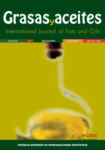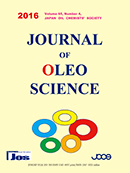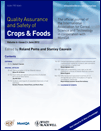
GRASAS Y ACEITES
Scope & Guideline
Pioneering discoveries in nutrition and functionality.
Introduction
Aims and Scopes
- Chemical and Physical Properties of Oils:
Research on the chemical composition, physical properties, and oxidative stability of various oils, including novel extraction methods and their effects on oil quality. - Nutritional Aspects and Health Benefits:
Exploration of the nutritional profiles of oils and fats, including studies on their fatty acid compositions and potential health benefits, particularly in relation to metabolic health and chronic disease prevention. - Innovative Extraction and Processing Techniques:
Focus on advanced methodologies for oil extraction, such as enzymatic treatments, supercritical fluid extraction, and the application of novel technologies like ultrasound and microwave-assisted processes. - Food Applications and Safety:
Studies examining the application of oils in food products, including their roles as functional ingredients, preservatives, and their interactions with other food components to enhance safety and quality. - Environmental and Sustainability Issues:
Research addressing the sustainability of oil production, including the valorization of by-products, waste reduction strategies, and the ecological impacts of oil extraction and processing.
Trending and Emerging
- Health and Functional Properties of Oils:
A significant trend is the increased focus on the health benefits of various oils, particularly in relation to metabolic syndrome and chronic diseases, underscoring the importance of oils in diet and health. - Innovative Preservation Techniques:
Emerging research on the use of natural preservatives and antioxidants in oils demonstrates a shift towards enhancing oil stability and shelf-life while minimizing synthetic additives. - Sustainability and Eco-friendly Practices:
There is a growing emphasis on sustainable practices in oil production and processing, reflecting global concerns over environmental impact and the need for eco-friendly methodologies. - Advanced Analytical Techniques:
The use of sophisticated analytical techniques, such as lipidomics and advanced spectroscopic methods, is on the rise, facilitating a deeper understanding of lipid properties and interactions. - Consumer Preferences and Sensory Evaluation:
Increasing research on consumer preferences, sensory characteristics, and the marketability of oils indicates a trend towards addressing consumer demands and enhancing product quality.
Declining or Waning
- Traditional Extraction Methods:
Research on conventional oil extraction methods has decreased as newer, more efficient techniques gain popularity, reflecting a broader trend towards innovation in lipid extraction. - Basic Nutritional Studies:
There has been a waning interest in basic nutritional studies that do not incorporate advanced methodologies or health implications, as the focus shifts to more complex interactions between oils and health outcomes. - General Reviews on Oil Types:
The publication of broad reviews summarizing various types of oils without specific applications or innovations has declined, as researchers now prefer to publish more targeted and detailed studies. - Minor Oil Sources:
Research on less commercially significant oils or those with limited applications has decreased, likely due to a growing emphasis on economically viable and widely used oil sources.
Similar Journals

ACS Food Science & Technology
Exploring the Chemistry of Culinary InnovationACS Food Science & Technology is a premier peer-reviewed journal published by the American Chemical Society (ACS) that addresses the dynamic intersections of food science, chemistry, and technology. With its E-ISSN: 2692-1944, this journal aims to disseminate innovative research and comprehensive reviews that enhance understanding in fields such as analytical chemistry, organic chemistry, and general food science. Despite the absence of an Open Access model, its position in the Q2 quartile for multiple categories in 2023 underscores its significant impact on the scholarly landscape, ensuring researchers can access high-quality research pertinent to today's food challenges. With an expanding timeline of 2021 to 2024, ACS Food Science & Technology is poised to be an essential resource for advancing the scientific community's knowledge, fostering collaboration, and bridging gaps between academia and industry.

Acta Scientiarum Polonorum-Technologia Alimentaria
Advancing Food Science Through Innovative ResearchActa Scientiarum Polonorum-Technologia Alimentaria, published by Poznan University of Life Sciences, is a revered journal in the field of food science, showcasing cutting-edge research and innovations in food technology. Established as a leading platform within its domain, this journal is indexed under Scopus and ranks in the 2023 Q3 quartile for Food Science, demonstrating its commitment to high-quality scholarship. With an ISSN of 1644-0730 and E-ISSN 1898-9594, it serves as a critical resource for researchers, professionals, and students seeking to stay at the forefront of advancements in food safety, quality control, and sustainable practices. The journal has also been recognized for its contributions to the agricultural and biological sciences, positioning itself at rank #205 out of 389 in this competitive field. While currently not offering open access, the journal's valuable insights and findings, especially as it publishes through 2024, play a crucial role in advancing knowledge and fostering collaboration among experts in the food science sector.

Food Chemistry: Molecular Sciences
Transforming Knowledge into Culinary ChemistryFood Chemistry: Molecular Sciences is a leading academic journal published by ELSEVIER, dedicated to advancing knowledge in the fields of food science and molecular biology. With an ISSN of 2666-5662, this journal is a key platform for researchers and professionals aiming to disseminate innovative research findings from 2020 through 2024. Recognized for its quality, it stands in the Q1 category for Food Science and Q2 for Molecular Biology as of 2023, showcasing its commitment to high-impact publications. The journal is indexed in Scopus, earning ranks of #98/389 (74th percentile) in Agricultural and Biological Sciences - Food Science and #214/410 (47th percentile) in Biochemistry, Genetics and Molecular Biology - Molecular Biology. Each article represents cutting-edge research that drives the understanding and application of molecular principles in food chemistry, making it an essential resource for anyone involved in the field. Although this journal does not offer open access, its rigorous peer-review process ensures that the content is reliable and of significant academic value, contributing profoundly to the body of knowledge in the respective disciplines. Located in Amsterdam, Netherlands, Food Chemistry: Molecular Sciences continues to inspire scholarly discussion and innovation within the scientific community.

International Food Research Journal
Fostering Excellence in Global Food ResearchThe International Food Research Journal, published by UNIV PUTRA MALAYSIA PRESS, serves as a pivotal platform for disseminating innovative research within the field of food science. With an ISSN of 1985-4668 and an E-ISSN of 2231-7546, the journal has successfully established its presence since its inception in 2007, converging its findings through 2024. This esteemed journal holds a Q3 ranking in Food Science, illustrating its valuable contributions to the field as demonstrated by its Scopus rank of 276 out of 389, placing it in the 29th percentile among its peers in Agricultural and Biological Sciences. Although it operates under a traditional publishing model, its academic integrity and focus on high-quality research ensure that it remains a vital resource for researchers, professionals, and students eager to explore advances in food technology, nutrition, and safety. By encouraging interdisciplinary collaboration and critical dialogue, the International Food Research Journal plays an essential role in shaping the future of food science research.

Journal of Oleo Science
Bridging Theory and Practice in the World of Oleo ScienceJournal of Oleo Science, published by the Japan Oil Chemists Society, stands as a pivotal resource in the domains of chemical engineering, chemistry, and medicinal applications, with a robust commitment to advancing knowledge in oleochemical research and technology. With an ISSN of 1345-8957 and an E-ISSN of 1347-3352, this open-access journal has been accessible to a global audience since 2021, facilitating the dissemination of high-quality scholarly articles and fostering collaboration among researchers. The journal, which has converged its publication scope from 2001 to 2024, currently holds a respectable Q3 ranking across multiple categories, reflecting its impact in the academic sphere. With Scopus ranks highlighting its position in general chemistry and chemical engineering, the Journal of Oleo Science not only serves as an essential platform for the latest developments in oleo science but also encourages the exploration of innovative approaches to tackling industry challenges. Articles submitted to the journal are subjected to rigorous peer review, ensuring that only the most significant and scholarly work is presented. By championing diverse perspectives and research findings, this journal is an invaluable asset for students, professionals, and academics dedicated to advancing the fields of oleochemistry and beyond.

Food Production Processing and Nutrition
Elevating understanding of food's role in health and wellbeing.Food Production Processing and Nutrition, published by SpringerNature, stands at the forefront of advancing knowledge in the vibrant fields of food science, nutrition, and public health. This esteemed Open Access journal, operational since 2019, plays a pivotal role in disseminating breakthrough research that intersects food production processes with nutritional insights, making it an invaluable resource for researchers, professionals, and students alike. With a commendable 2023 impact factor reflecting its robust scholarly contributions — Q1 in Food Science and Q2 in both Nutrition and Dietetics and Public Health, Environmental and Occupational Health — the journal not only emphasizes the importance of innovative food processing methods but also addresses pressing nutritional challenges faced globally. Located in the United Kingdom, it claims an impressive Scopus ranking, with a notable percentile standing across various categorical metrics. As such, Food Production Processing and Nutrition is essential for anyone aiming to deepen their understanding of how food systems impact public health through effective processing and nutritional strategies.

Journal of Oil Palm Research
Transforming Research into Practice for Oil Palm SustainabilityJournal of Oil Palm Research is a pivotal publication in the field of agricultural science, specifically focusing on the multifaceted aspects of oil palm cultivation, research advancements, and sustainability practices. Published by the MALAYSIAN PALM OIL BOARD, this journal serves as a significant platform for disseminating high-quality research and innovative solutions in oil palm agronomy, genetics, and socio-economic impacts, capturing the interest of researchers, industry professionals, and students alike. With an E-ISSN of 2811-4701, the journal is committed to presenting peer-reviewed articles that aim to enhance the understanding of oil palm's role in global agriculture and its contributions to environmental sustainability. The absence of a traditional access fee underscores its dedication to open access principles, fostering broader dissemination of knowledge. As the oil palm industry continues to evolve amidst environmental and market challenges, the Journal of Oil Palm Research remains essential for those dedicated to this field, offering insights that inform practice and policy.

Quality Assurance and Safety of Crops & Foods
Elevating standards in agronomy and food science.Quality Assurance and Safety of Crops & Foods is a leading peer-reviewed journal, published by CODON PUBLICATIONS, dedicated to advancing the fields of Agronomy and Crop Science and Food Science. Since its inception in 2009, this journal has established itself as a crucial platform for researchers, professionals, and students, focusing on the vital intersection of agricultural safety and food quality. With a commendable impact factor and a current Scopus ranking placing it in the top quartiles of its field (Q2 in 2023), it serves as an essential resource for those committed to ensuring the safety and quality of global food supplies. The journal provides open access options to enhance the dissemination and accessibility of research findings, thus fostering collaborative efforts to tackle contemporary challenges in food production and safety. By showcasing innovative methodologies and cutting-edge research, Quality Assurance and Safety of Crops & Foods not only contributes to scientific discourse but also plays a pivotal role in informing policy and practice in sustainable agricultural practices.

ITALIAN JOURNAL OF FOOD SCIENCE
Elevating Global Knowledge in Food ScienceITALIAN JOURNAL OF FOOD SCIENCE is a distinguished open-access publication dedicated to advancing knowledge in the field of food science, catering to a global audience of researchers, professionals, and students. Published by Codon Publications in Singapore, this journal, operating under the ISSN 1120-1770 and E-ISSN 2239-5687, has been a vital platform for scholarly discourse since its inception in 1996, converging towards a comprehensive view of food science trends through 2024. With an impressive ranking in the third quartile (Q3) of the Food Science category and a Scopus rank of #151 out of 389, the journal plays a significant role in disseminating high-quality research, contributing to a richer understanding of food science within the agricultural and biological sciences. Since transitioning to open access in 2008, it has further expanded its reach, ensuring that innovative research is accessible to all, thereby fostering collaboration and knowledge exchange in this vital industry.

Food Chemistry-X
Connecting Researchers to the Future of Food Science.Food Chemistry-X is a premier open-access journal published by Elsevier, dedicated to advancing the field of food chemistry through high-quality research and comprehensive reviews. With its ISSN of 2590-1575, the journal has gained significant attention since adopting an open-access model in 2019, allowing wide dissemination of knowledge and innovations in food science. Based in the United Kingdom, it holds prestigious Q1 rankings in both Analytical Chemistry and Food Science categories as of 2023, positioning itself as a leading platform for researchers worldwide. The journal's focus spans extensive topics within food chemistry, including food safety, nutritional analysis, and the chemical properties of food, offering insights that are crucial for addressing contemporary challenges in food production and consumption. With a Scopus rank placing it in the 65th percentile among the top journals in Food Science and the 58th percentile in Analytical Chemistry, Food Chemistry-X is an essential resource for academics, professionals, and students seeking to stay at the forefront of research and innovation in this vibrant field.